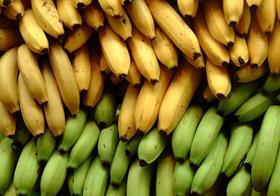
The world’s first human trail of genetically modified (GM) bananas, enriched with beta-carotene that converts to vitamin A in the body, will begin in the US in coming weeks.
Lead by Professor James Dale, Australia’s Queensland University of Technology (QUT) Centre for Tropical Crops and Biocommodities has developed a ‘super’ banana that aims to prevent children in East Africa from going blind, and potentially dying, from severe vitamin A deficiencies.
QUT has shipped 10kg of the engineered bananas to Iowa State University for a six-week human trial, with results expected by October.
'Human trial is a significant milestone for this project which started in 2005 and should see pro-vitamin A-enriched banana varieties being grown by Ugandan farmers around 2020,' Professor James Dale said in a statement from QUT.
'The Highland or East African cooking banana, which is chopped and steamed, is a staple food of many East African nations but it has low levels of micronutrients particularly pro-vitamin A and iron.
'There is very good evidence that vitamin A deficiency leads to an impaired immune system and can even have an impact on brain development.”
The Bill and Melinda Gates Foundation invested almost A$10m in the project, with legislation to enable commercialisation of GM crops in Uganda expected to be in place by 2020, potentially opening the doors for GM bananas in other African nations.
'We know our science will work,' Professor Dale said. 'This project has the potential to have a huge positive impact on staple food products across much of Africa and in so doing lift the health and wellbeing of countless millions of people over generations.'



